#and blurbs are the worst indicators of possible interest points
Explore tagged Tumblr posts
Text
i guess i'm just mostly driven by that interest in where the absurd and the sublime are the same thing. I like things that are ridiculous but magnificent at the same time, and that are unashamed in their intensity, that aren't trying to be clever or prove a point. It just *is*, and is what it is, and combining that honesty with a lens that acknowledges the ridiculousness of existence and being and yet the magnificence of persistance, that's what gets to me
#personal#media stuff#why i struggle to find things that motivate me to make the effort to engage#also why when i do find something i deep dive it from angles that aren't 'consuming' it repeatedly (not a repeat-watcher/reader typically)#the number of things that hit a sweet spot are so limited#i do reckon you can tell if someone loved the thing they're creating too. it leaves marks#i like things that were beloved by their creators. not chores or grind jobs or compromises. which further limits what appeals#definitely not genre motivated tho#and blurbs are the worst indicators of possible interest points
3 notes
·
View notes
Note
i honestly can’t stop thinking about mob!tom and like being a little brat for him, thinking i’m all tough and like.... spitting in tom’s mouth.... and he’d love it i think??? and then he’d switch it and be back in control and choke me and spit in my mouth..... fuck
you didn’t ask for a blurb but istg reading this set me on fire so ... here we go... the battle for dominance from your worst (or best?) nightmare, ft mob!tom......
mob!tom || wc: 1.8k || 18+ nsfw content minors dni!!!
warnings ↠ sir/good girl kink, dom!tom, brat taming, degradation (slut shaming), choking, spitting, pussy + face slapping, a gnarly battle for dominance ft fingering and face-fucking. i missed writing dom!tom. god.
*:·゚✧*:·゚✧ *:·゚✧*:·゚✧ *:·゚✧*:·゚✧
You don’t challenge Tom often, but when you do, there’s no point holding back. He’ll be firm with you no matter how far you take it, so you may as well push the limits as far as possible. You like the punishment that follows, crave the degradation and the battle for dominance that ensues.
You aren’t scared to fuck with him, which is why you manage to get yourself into this position: Tom, pressed against the bedroom wall, your figure boxing him in. You have your hands resting on his shoulders, firm fingertips keeping him there, even when he tries to passively shove you off.
“Now, what do we have here?” Tom asks, voice smooth and entirely too innocuous considering you’ve just slammed him up against the wall. He remains completely unbothered, blinking at you blankly, eyes only showing the smallest amount of intrigue.
You hum. “I’m in charge today,” you decide, but your words don’t come out as strongly as you’d intended. It’s almost as if your body knows exactly how the night is going to go. “I’m going to dom you.”
Tom laughs. His face splits with amusement as he looks you up and down sceptically. “Yeah, okay,” he says. “I’d like to see you try, darling.”
Scowling, you square up. “I can dom you,” you tell him. You move one of your hands from his shoulder and teasingly draw it up to twirl around the base of his neck. As you try out a variety of pressures against Tom’s throat, his interest increases. He starts looking at you with a little more interest, his eyebrows pulling together as he watches you experiment. You get the feeling that he’s just biding his time, waiting to see what you’ll do, but you use it for your advantage.
“You’ve never once given any indication that you’d want to try and dom me,” Tom says. He looks you up and down before laughing again. “You’re lying to get a rise out of me.”
You narrow your eyes. “Am not,” you lie, despite him being completely right. You don’t want to dom him—you want to make him snap. Pursuing this goal, you don’t hesitate to bring your fingers away from his throat and run your fingertips over the ghost of his mouth, pressing your thumb against his lower lip. “Open,” you say, taking Tom’s favourite command and turning it on him.
“I don’t think you want to do what you’re trying to do,” Tom warns. “You’re not going to like what I do to you if you keep this up.”
You jut out your chin and tap his lower lip again. “Open,” you repeat.
Tom complies, but only after another mirthless laugh. It’s almost scary how cool he is, how calculated. There’s no hint of insecurity as he opens his mouth, and it’s clear that it doesn’t matter the positioning—he’s in control, and you’re not.
That isn’t going to stop you from pushing him to the very edge, though. You stand closer, meeting his eyes teasingly before sucking the moisture to the front of your mouth and spitting into Tom’s open mouth. Your spittle lands on his tongue, and you step back, moving very slowly as if around an animal that risks pouncing.
A moment passes, the air between you frozen, thick with tension. Tom shifts, sighing for only a second before he overpowers you. Acting swiftly, precisely, he pushes off from the wall, commanding enough force to slip free from your grip. You huff as he pushes you against the wall instead, so forcefully that you feel an ache in your back. Before you have time to question him, his hand is on your throat. Tom growls, pressing the length between his index and thumb up against your neck, choking you lightly as his other hand goes to your mouth.
He doesn’t need to say anything. His lips are pursed, energy rippling his eyes until they’re almost black. He hasn’t spoken since you managed to spit in his mouth, and you realise there’s a purpose behind that. Tom yanks your mouth open, pressing his thumb harshly against your tongue until you’re wide enough for him to step in closer. He grunts before spitting into your mouth, the pressure leaving your throat as you feel the mix of his and your saliva, hot against your tongue, rolling back towards your throat.
“Brat,” he spits. He cups your chin and holds your mouth shut, staring at you, unmoving, until you swallow. Tom looks entirely too composed. Whilst you’re panting, your face warm, he seems unaffected. His hair is still gelled, his cheeks pale, and his eyes dark. It makes you shudder. “Why are you being so needy?” Tom tilts his head to the side. “You want attention, hm? My needy little brat, trying to act tough so I’ll put her in her place?”
You whimper. Tom laughs coolly, then leans closer. You think he’s going to kiss you, but instead, he licks over your mouth, denying you what you want as he brands you with his spit instead. He’s messy, hand returning to wrap around your throat. As he pushes you back against the wall, his other hand moves down, shoving between your legs until he’s able to cup your heat. You’re in a skirt without panties, meaning there’s no hesitation in his actions. Tom’s able to touch your bare pussy, his fingers cold as they trail through your slit.
“Fucking hell,” he adds, glancing up at you. “You’re so wet.” To prove his point, Tom curves two fingers into your heat, your walls giving way after a few pumps. The feeling of his slender digits rubbing up against your sensitive spots makes you cry out, your eyes fluttering shut. “Such a pathetic little slut, hm? Getting off on being a brat with my hand around your neck? Fucking hell…”
You try to speak, only for the words to come out slurred and incoherent. It’s hard to focus with Tom’s fingers pistoning into your heat, your walls clamping down around the stretch of his hand as his thumb twists up to play with your clit.
“Yeah, that’s right,” he mutters. Tom pauses, leaning up to briefly kiss your cheek before his hand slips from inside your heat. He doesn’t pull away, though. Tom brings his hand down over the front of your cunt, slapping over your clit once, twice, thrice, the jolting stings making you cry out. He doesn’t stop until you’re squirming, your folds hot and pulsing, entrance weeping arousal and pulsing around nothing. “Get on the floor, brat.”
Tom pushes you down, but his touch is gentle. When you’re on your knees, his hand stays on your cheek, fingertips rolling across your cheekbone, encouraging your actions as you undo his belt and pop his top button reflexively.
“There’s a good girl,” he mutters. “Knew you didn’t want control.” Tom pulls away from you and pushes down his jeans and boxers all at once, leaving you with the sight of his cock, flushed and erect. He holds his length in his hand, skimming his thumb across the beads of precum that pool at his tip before smearing it across your lips. “Say thank you,” he adds, huffing a sigh. “You haven’t forgotten your manners, have you?”
“Thank you, sir,” you whimper. His precum seeps across your tongue, and you feel ravenous. “Please let me suck your cock,” you add, opening your mouth wide for him. Tom’s fingers slip into your mouth, and he coaxes your tongue out, leaning over and eyeing you carefully before spitting again, his spit landing on the tip of your tongue.
“I’ll fuck your throat until it’s raw,” he promises. Tom steps forward, guiding his cock to your mouth. He runs it over your tongue, the heavy, warm weight making you moan. Again, he pauses, cupping your cheek gently. “Touch my thigh if you want to tap out,” he adds. He doesn’t do another thing until you nod, reassuring him that it’s okay, that this is what you want, that you trust him. Tom hums, then he jerks his hips and pushes his cock into your mouth.
He fucks your mouth hard, relentlessly, his bulbous tip pressing against the back of your throat with no warning. Tom doesn’t give you time to adjust, not even as you struggle to fight your gag reflex. As your eyes well with tears, he holds the back of your skull tightly, keeping you as still and compliant as possible as the hot beads of water start to spill down your cheeks.
“Such...a good...brat,” he groans. You moan around him, feeling the stretch of his length aching your lips. “Take it, there’s a good girl…
His cock is so big, so heavy on your tongue. It takes everything in you to keep your fingers away from your cunt, but you know better than to cross that line. If the hunger behind his actions tells you anything, it’s that he’s pissed, and you don’t want to push him. Not too far. Not when Tom’s entire aura is one of steeled dominance.
“Shit, darling… Such a hot little mouth. ‘M gonna cum.” You look up at him, admiring the red flush to Tom’s face and the tensing of his jaw. He groans as he sees you, choking and crying around his cock, sounds of obscenities electric in the air. “Shit, shit. You’re going to swallow it, yeah? Needy cockslut. I know you fucking live for this.” He gently slaps your face before roughly pushing his fingers into your hair. “Greedy girl.”
You moan around him, and it’s the final straw. Tom peaks with a yell of your name, his hips pushing deep against you until your nose nudges up against the curls of his pubic hair. His seed shoots down your throat, spilling warm against your tongue, and you do your best to swallow, continuing to keep your mouth soft and pliant under he’s satisfied.
Tom pulls away after a few moments, opening his eyes to look at you as he pants. His hair is messier, cheeks stained a dark red, a blissed expression dominating his face. He’s quick to help you to your feet, and your wince at the pain in your knees fades as he kisses your lips softly.
“Good girl,” he mutters. “Good brat.”
You bite your lip, standing back and looking at him. “Can I cum now?” you ask.
Not for the first time this evening, Tom laughs at you. You feel your expression fall, and it only seems to spur him on further. He smirks before kissing the tip of your nose again, both of his hands moving to hold your waist.
“Oh, darling,” he murmurs, voice dark. “What a silly question.”
#wrote an entire essay today + still had time to exhibit **** behaviour on main#you know it#tom holland smut#tom holland x reader#tom holland x reader smut#smut#mob!tom x reader#mob!tom x reader smut#mob!tom smut#mob!tom#myblurbs#tomblurbs#tom.filth
726 notes
·
View notes
Note
Hi!
I'm here for a pretty stupid thing actually but I've always found it annoying to do: summaries for fics. I never know how much is too little, how much is too much, or if what I'm putting is going to make people think “wow this sounds interesting” or “wow what a shit, keep scrolling”
Do you think it is better to make a summary as such, or include some lines from the story? Idk, any advice would be appreciated
Thanks for taking your time to read!
Hugss🥰
Hey Nonny!! *HUGS*
Ah, the bane of all writers... the blasted summary to describe your story in as little words as possible to get people interested. The LITERAL very last thing you have to do on a story. Always a fun time.
And it's daunting and can feel very overwhelming, because, just like in advertising (my professional background), you have a TINY window to grasp people's attention and make them WANT to click on your fic to read. As an avid reader of fanfic, I do have my own preferences on what I look for... but as a professional, I think I can offer some wisdom in this part here, for a change. PLEASE KNOW that this is different for EVERYONE! These are just some things I picked up in my 20 years in advertising, and applying it to – what is essentially – a "classifieds" board for stories.
Attention-Grabbing Title – Not PERTINENT, but the average reader is more likely to continue reading what you have to offer if your headline is interesting. Even one word ones can grab attention. Something whimsical or metaphorical to your story is always a winner.
Short and Concise Description / Call to Action – One to two sentences is an average attention span before someone gets bored and moves on to the next post. You need to entice someone into reading MORE of your summary in those first two sentences, if you have a long summary. Start your summary with the subject of the story. ie. "John has a problem: he's well hung." That example right there will entice someone to read your summary further.
Grammar Check your Summary – BECAUSE the summary is a representation of what's to come in your story, make sure you get that summary spell-checked or beta'd with your beta. It's a small thing, but it can help bring people in, and especially if you're trying to appeal to a language that you're unfamiliar with. Your beta can even help you refine the summary so it's more attention-grabbing.
Rate Your Story – "Not Rated" stories have a lesser chance of being read than something rated. Doesn't matter what it is, just put a rating there. At least, if people are doing a ratings filter, then you will show up in a search result.
If You're Writing a WiP, State the status of your story at the end of your summary. Many people such as myself don't want to start a WiP without the certainty that it will be done. Stating something like "Story is finished, new chapter every Friday" is a GREAT way to get engagement on your story, AND generate excitement and buzz for it from the day-oners. THEY are your advertisers. A LOT of people like the suspense of a week-to-week model... it's why syndicated television is still alive! A lot of our Fandom authors do their stories this way, working on chapters weeks in advance while posting chapters "approved". It gives YOU time to write and proof, while also having a Live / Active WiP Story that will keep people coming back.
So yeah, those are some tips from an advertising standpoint.
As a reader, though, my PERSONAL interest in a fic is based solely on these 4 things:
The Ship Tags – use "/" (slash for Slash-fiction) for romantic and sexual relationships, and "&" for platonic/friendships or non-sexual relationships. I, for a fact, DO filter stories by the ship tags FIRST, so I'm sure other people do too. Make sure that you use them.
The Story Tags – Ao3 has spoiled us with these!... List relevant tags, tropes, Universes, and genres that pertain to your story... these are what help get your story found in the search algorithm. Don't write "tumblr-style tags" (ie. "this story took way too long") into this field. It is a big turn off for many people (myself included), AND it fucks with the Ao3 search results. Use author notes or descriptions to write your Tumblr-style musings! The tags should ONLY contain content within your story that may appeal to people OR help trigger/content warn against stuff. Yes, I understand that many authors poo-poo on "spoilers in tags", but in all the years I have been reccing fics, I have NEVER ONCE been told that people don't like how meticulous I tag everything I rec. A LOT of people will use those tags to filter OUT stuff that they personally can't read or don't like. Apart from the summary, the Tags are VERY important, AND it can help you come up with a more interesting and short summary that doesn't need to be descriptive. Use the suggested tags that Ao3 offers when you start typing – these are tags, I believe, that have been used frequently on the site.
The Summary – I KNOW it is legit the worst thing to have to come up with, but your story has a higher chance of being read if you stick to writing a concise summary as I've pointed out above. Some people also may choose to use an interesting blurb from their stories as a preview, which some DON'T like, but it's honestly better than nothing. I know for a fact that I have skipped over stories that don't have SOMETHING in the summary box NOR any tags. I know this isn't what you want to hear, Lovely, but put something here, even if it's just "A literal fuck-tonne of porn without plot" (I give authors permission to steal that pun, LOL).
WiP or Not – This is one of those "gamble" things. As I mentioned above, some authors do a week-to-week advanced model for their story chapters, while others "post each chapter when done". The latter tends to wind up with stories in limbo. PERSONALLY, I don't read WiP's for the simple fact that I get confused REALLY easily on plot lines when I do – I like reading one whole story in one go. But PLEASE don't take this as the golden end-all/be-all. This is a personal preference, since I read a LOT of fics and I have very little time these days to do it. Some people love WiPs. A good way to indicate that you have a story plotted out, but is NOT a week-to-week model? Add the Chapter count, rather than leaving it as "?". People are more likely to follow your WiP WITH a chapter count, since it gives the illusion that you have a rough draft written out and you know how long it will be.
So yeah! I hope this helped you out a bit, Nonny. Sorry it's so long, but I thought with how long I've been reading fics and with how picky I am with fics, these tips would be helpful for you. Again, at the end of the day, it's ALWAYS up to personal preferences of the readers. And don't take it personally if you can't "get an audience" right away. Just be yourself, write because you LOVE writing, and you will have a fruitful and enjoyable time publishing your story!
If any experienced authors in the fandom want to add their two cents from a WRITER'S perspective, please do! <3
122 notes
·
View notes
Text
By the Grace of Granville
(Warning: This post is long. But what else is new when it comes to character analyses?)
One of the bigger mysteries that gets introduced into Big Hero 6: The Series made their introduction in the very first episode, got a little bit of expansion into their background, and then didn’t really see much daylight for the rest of the series sand her becoming an even-numbered wheel. No, I’m not talking about Obake.
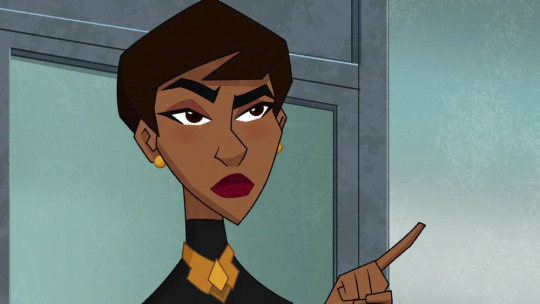
I’m talking about Professor Granville, the newly-installed dean of the San Fransokyo Institute of Technology.
People, including myself, play Granville up as some sort of Nick Fury-esque figure. She’s always in the know, gives advice to the team, and seems to have a general understanding of everything at once.
This is further helped by the fact that we don’t know a lot about what she has been up to since she resigned after Obake’s accident. It’s hindered by the fact that there may be some misinformation going on at the Big Hero 6 Wiki.
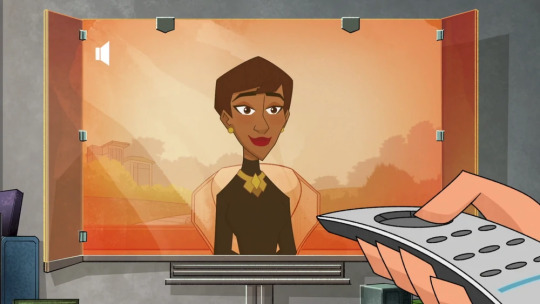
Here’s the introductory blurb for Professor Granville on her page:
Grace Granville has been a professor at the San Fransokyo Institute of Technology for at least 20 years, having taught Wendy Wower and Trevor Trengrove among other modern day geniuses.
She used to teach robotics and had her own star student, Bob Aken, but once he began an experiment to build an energy amplifier, it went awry as the amplifier exploded on his face, the result of which sent him to the hospital.
Though Bob survived, Granville felt extreme guilt from the incident and resigned. However, she kept the remains of the amplifier, possibly unaware that it still worked, as a reminder to not repeat the same mistakes.
She would return decades later to teach thermodynamics when Robert Callaghan, the dean of the institute at the time, was thought to have died, then resurfaced as the villain Yokai and was arrested for putting San Fransokyo in danger. Professor Granville became the college's new dean as she settled into her new role quite well. Now, after rewatching “Mini-Max”, I call into question the very first part that she’s been a professor there for at least 20 years. As far as I am aware of, that has never been said or confirmed in the show. She said herself (and the yearbook and Callaghan confirm this) that she worked there 20 years ago. That’s not the same thing. Working there for 20 years is not the same thing as being there 20 years ago. So is that a discrepancy or am I the one who doesn’t remember things correctly?
And let’s go to what Callaghan said about the incident when Hiro went to visit him in prison in “Mini-Max”:
Robert: “She was in the lab after hours. Something went wrong. There was...an incident.”
Hiro: “What kind of incident?” Robert: ”Officially, a pipe burst. But there were rumors. An unsanctioned project gone wrong.” Hiro: ”So she was fired?”
Robert: “She resigned. The matter was not pursued further. That’s all I know.” OK, first of all...was Callaghan not the dean twenty years ago? And even if he wasn’t...
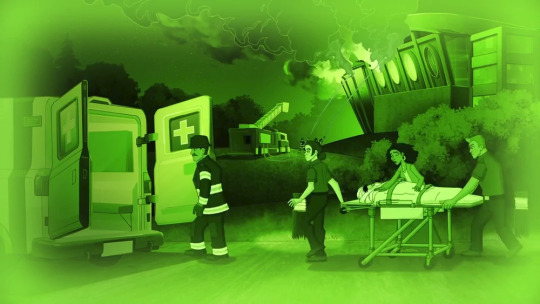
Does anyone think that was caused by a simple burst pipe? What was in said pipe? Lava? TNT? Mentos and Coke?
That leads to the second possibility: Callaghan was Dean at the time, knew about it, and “pushed” Granville to resign to avoid a messy lawsuit.
But we’re getting away from the original point, which is...what exactly has Granville been doing this entire time? I find it hard to believe that Granville was still at the school when Tadashi, Go Go, Honey Lemon, and Wasabi were there. You’d think that one of them would have said something about it, and all through the conversations in “Mini-Max” gave no indication of that as well.
So she’s been gone for twenty years (presumably). Which begs the next question... Why did she have to become the dean? Endangering a student’s life is a very serious thing. Something like that can’t be just forgiven. So, why did it have to be her? It’s not like there’s not other candidates:
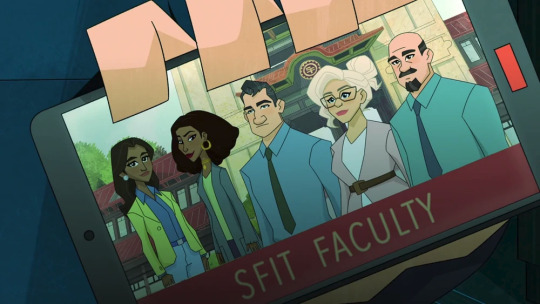
(From left to right: Monica Rambeau [one of the Physics professors], Grace Granville, Robert Callaghan, Linda Carter, and Timothy Dugan. Note that these are merely names I’ve given them based off of who I think they are and not canon names. However, for the sake of simplicity, I will refer to them as such from here on out.) Monica might have been a good replacement. Linda’s just the nurse, so unlikely. Dugan’s the Dean of Athletics, so probably not. The dean doesn’t have to be the robotics professor, right? Granville teaches Thermodynamics. And then you have Professor Kameela from the comics, who appears to be another Physics professor:
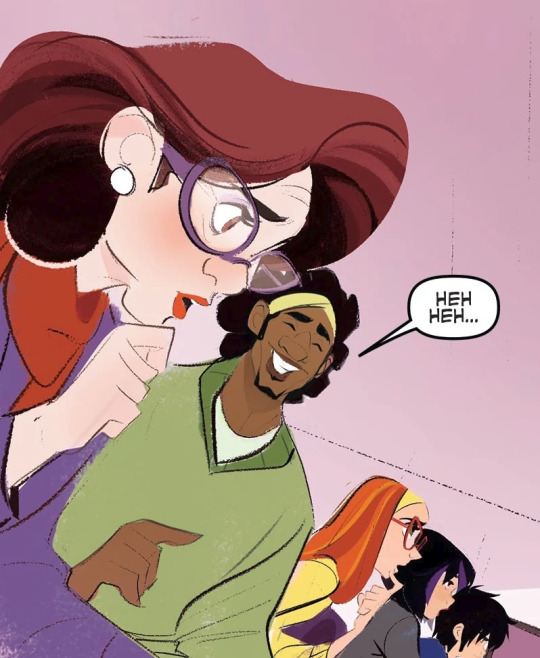
So why her?
Granville’s been out of the game, as far as we know, for a long time. Did the board at SFIT really have no other options other than Granville? Why give the top job to someone who hasn’t even stepped foot in SFIT for decades?
And the worst part is that I don’t really have a good answer for that. The show delves into Granville’s history with Obake a lot and not enough into her actual history with SFIT, so that part is pretty much an unsolved mystery.
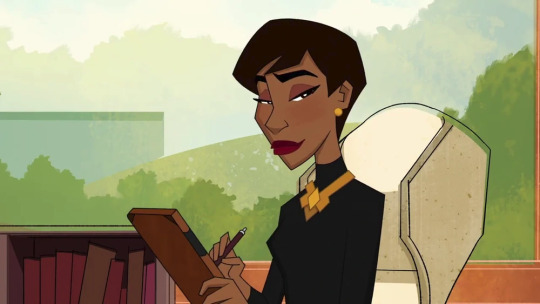
And if the info on the Wiki is true, then that means...what? Granville was teaching for 20 years, and then took a 20 year break. Wouldn’t that put Granville in her 60s, at minimum? (She looks pretty good for possibly being in her 60s. Maybe she got some Infinity Formula from her possible Marvel counterpart.)
I think it’s much more possible that she’s in her early 50s. That gives her enough time to be a professor, have an actual working history, and then have to leave with Obake’s accident. So my personal timeline for her career would be something like this. For the sake of being simple, let’s assume that Granville is an even 50, and also that Big Hero 6 the movie takes place in the year 2031 (as per movie screenshots):
1981 - Grace Gretchen Granville is born 2002 - Graduates college (perhaps at SFIT; haven’t thought that far ahead) Sometime between 2002 and 2004 - Granville begins her work at [Redacted] 2005 - Granville become a TA in the Thermodynamics department (as per Highway to Hell Chapter 2, “In The Details”) 2006 to 2007 - Given government assignment to [SORT OF Redacted] 2007 - Returns to SFIT 2007 to 2011 - Becomes thermodynamics professor at SFIT; continues periodic work at [Redacted] 2011 - Obake’s accident; Granville resigns from SFIT 2011 to 2013 - Takes a position with [SUPER Redacted] in Symkaria 2013 - Returns stateside and [Redacted] 2013 to 2031 - Various jobs and positions, including start-up at Fathom Blue Incorporated and a instructor at the San Fransokyo Police Academy with Sara Pezzini 2031 (Current Time) - Granville becomes Dean at SFIT (Keep in mind that this is a sliding timeline which is subject to change. Probably.) Man, that’s a lot of redacted information. It’s almost like she worked for a secret government organization and did a lot of things that aren’t on the public record or something.
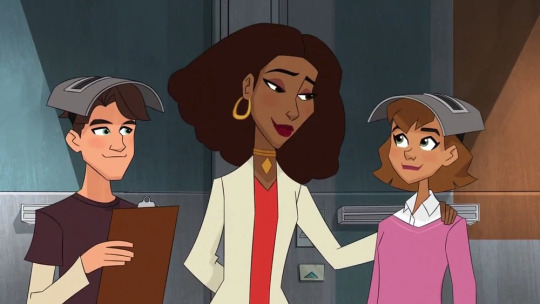
I am going to delve into Granville’s history in future stories, and that will include something that I’ve done a fanart on. Mainly this:
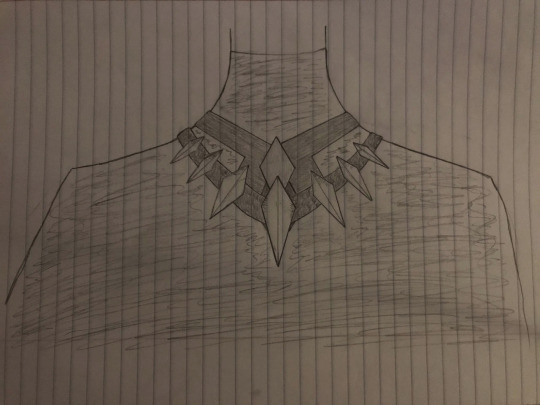
The Wakanda story is going to happen at some point, and it’s going to involve one of the redacted items above (from 2002 - 2003). What exactly she was doing there is going to stay secret for a little bit. Speaking of which, I had done research on a few pieces of Wakandan technology. Guess which one I found of particular interest.
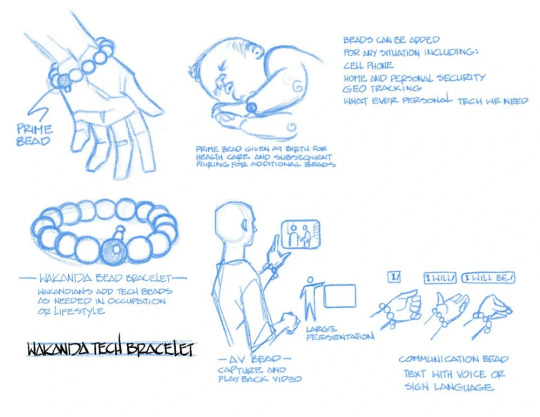
The Kimoyo Beads. A bracelet given to every single Wakandan citizen that stores all of their medical information and serves as an everyday tool for them. It also notes that it doesn’t work outside of Wakanda because of its reliance on tapping into Vibranium as a power source.
Now, what would happen if a very realistic version of Vibranium were to find its way out of the country and into Granville’s orbit?
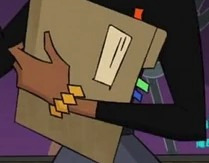
I wonder if her bracelet would start working again. Mysteries abound when it comes to Grace Granville. If we’re lucky, maybe we’ll solve a few of them before too long.
#big hero 6#big hero 6 the series#grace granville#professor granville#wakanda#black panther#redacted#hiro hamada#sfit#sfit faculty#monica rambeau#linda carter#night nurse#robert callaghan#dum dum dugan#obake#what has she been doing all this time?#the world may never know#the life of an sfit dean
51 notes
·
View notes
Text
Tsumugi Shirogane Deepdive: Prologue
I’m in a DR mood right now, and really enjoying revisiting Tsumugi in particular, so I thought I’d do a chapter-based retrospective focusing on all the cool Tsumugi material! A reread project especially rewarding for a character like Mugi, so I’m really excited.
In this series, I’m focusing a lot on all the foreshadowing, and also what we can extrapolate about Tsumugi’s true character along the way. I’ll be doing this chapter-by chapter, including the prologue as well as an installment for her Free Time Events.
Full spoilers for V3 under the cut.
The Pre-Prologue
We first see Tsumugi in the gym by the exisals to get their uniforms and their memories. Tsumugi herself has four lines of dialogue in this scene, nothing that particularly stands out, but there are a couple of things worth noting about how she (and everyone else) is dressed.
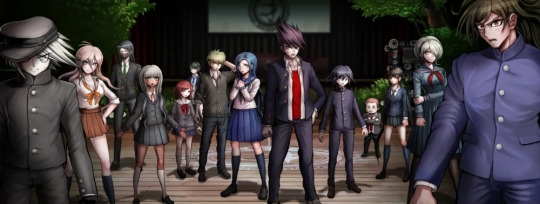
Kaede describes how she was kidnapped on her way to school, and it sure looks like that’s the case for almost everyone in the room. We’re used to seeing DR characters in flashy outfits that vaguely resemble school uniforms but actually reflect their individuality, so when the game first shows them in an ensemble lineup like this, it’s a lot more striking.
Not so much in this CG. While there are plenty of visual details that tell us about these characters (Saihara’s already hiding under a hat in his sprites; Iruma is revealing; Kiibo and Gonta are buttoned up and orderly, but Kaito’s shirt and jacket are undone to show a bold-colored undershirt), their uniforms look like they’re doing what uniforms are supposed to do: be bland and blend in.
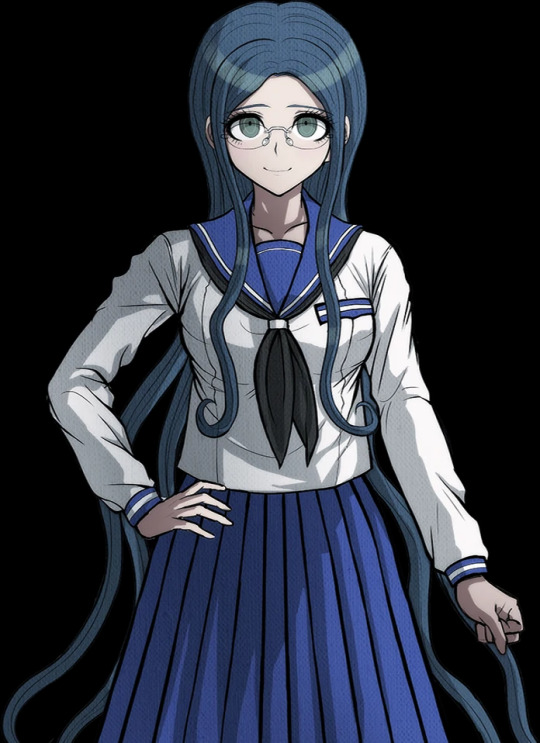
What about Tsumugi? Tsumugi wears a basic uniform like everyone else, but this is where we get the game’s first indication that all is not what it seems with this girl. The clue is the blue. She is the only one in the lineup whose primary color isn’t a neutral tone. What’s more, it’s the same shade of blue Tsumugi is associated with throughout the game. Visually, part of her is already in character as Tsumugi Shirogane, SHSL Cosplayer.
Of course, there’s a much bigger item foreshadowing Tsumugi as the bad guy, which is that in advance of everyone getting their “memories”, the main emphasis is their new clothes delivered by the Monokubs.
There are a couple of reasons the clothes are significant. For starters, there’s a direct line to Tsumugi’s cosplay talent. For anyone inclined to suspect her before starting the game on account of her talent (and her general don’t-look-at-me-I’m-not-suspicious vibes), this is immediate theory fodder. This also primes the audience to look at the setting of V3 with a critical eye, between the contrast of the kids’ boring outfits and their flashy new ones and the Monokubs making explicit references to starting the “story“, there is an immediate suggestion of artifice that runs all the way down to their identities. Not for nothing is Kaede’s magical girl transformation visually similar to the memory light.
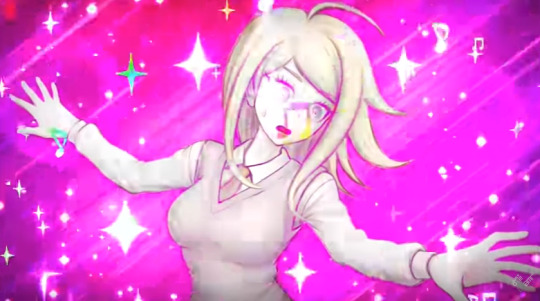

Another thing: pre-memory light, the person in the room whose outfit is the least uniform-y is Amami.
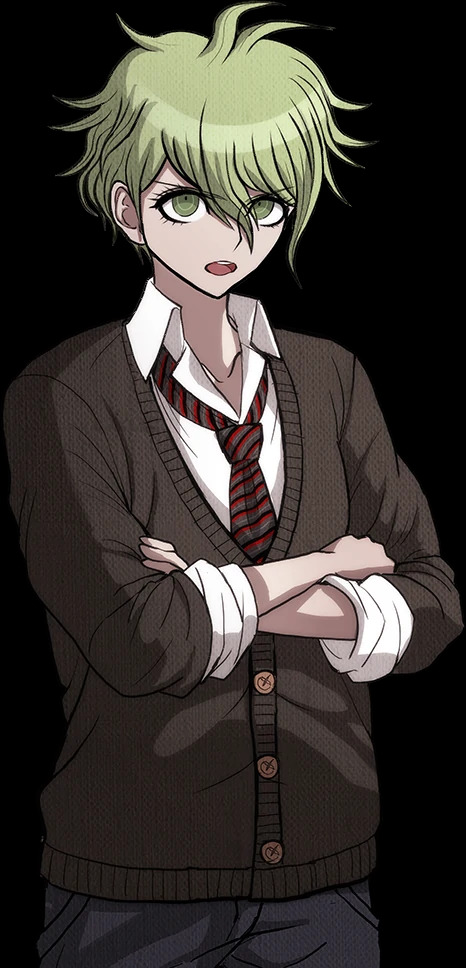
At the very least, it’s a look that’s noticeably more casual than what most of the cast is wearing. After Chapter 6, we know that Amami made it to the end of the 52nd Killing Game before he and Tsumugi were condemned to execution via participating in the next killing game- which he seems to be realizing in this scene- so it’s possible they’re coming right off the heels of the last killing game. It’s an ongoing mystery what his relationship with her was like up to this point? Does he know she’s the ringleader? Is “Tsumugi Shirogane“ anything like the person she was in the last killing game, assuming she was even there?
I’m not confident Tsumugi really switched to a new persona for the 53rd Killing Game, even though fake identities is kind of her whole deal. I’ll get more into why in this series, but I think a lot of the character we see in the game is the “real“ Tsumugi, to the extent that such a person even exists.
Introducing Tsumugi Shirogane: Professional Cosplayer, Sex God
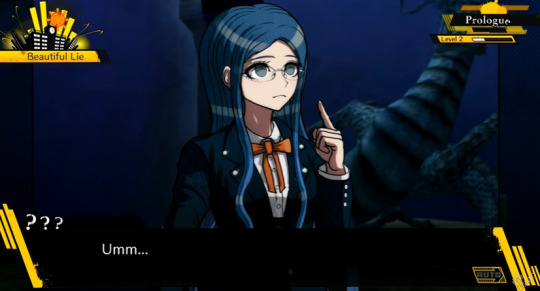
If you go back and read the promotional blurbs for V3, Tsumugi’s mention her tendency to get so lost in thought that she’ll ignore everyone around her. This little trait isn’t super weird at first, until you realize later in the game that she doesn’t carry the shtick past the first chapter. It’s like she wrote the character blurbs herself, realized everybody has a wacky “thing“ that would come up immediately in the introductions, and came up with an act of low-grade wackiness so she’d fit in in the prologue.
This is great stuff, looking back. It gives an intro in brief to the many contradictions of Tsumugi Shirogane. On one hand, it’s overly phony and performative. But on the other hand, there’s a core of truth there about her character- she really is someone who stays in her thoughts without a care for anyone around her, albeit less in the cute way and more in the horrifying sociopath kind of way.
It also tells us something important about Tsumugi’s commitment to the Killing Game. She cares about maintaining the integrity of this world and its characters, but is pretty indifferent about maintaining a role for herself. She doesn’t give a shit about having a storyline or even much of a character. The pleasure of DR comes from what she can get as an observer/consumer.
This is entirely consistent with what she tells Kaede and Saihara about herself and her feelings about cosplay in the actual introduction.
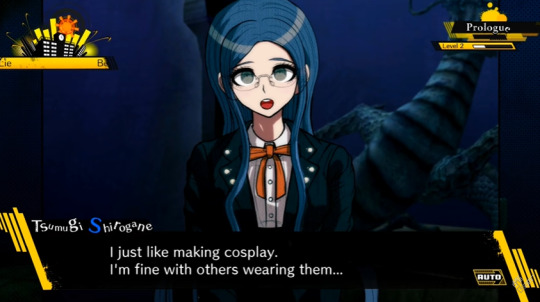


This is the ethos that makes me wonder how dishonest Tsumugi really is. She’s dishonest as hell, of course, but given that she later applies the entire DR LARP reality show experience as “cosplay“, what she says about her convictions largely rings true. She clearly cares about making her tribute an authentic one (lol), which extends to her being the primary creative director inside her fiction bubble.
It partly explains why she spends the next five chapters being little more than furniture. In her mind, her job as a producer precludes her from being a character in her own right, because doing anything to pull focus is tantamount to self-promotion, and, well, that’s an abuse of power that gets in the way of the story!
(sidebar: there are some fascinating things we could speculate about what she says about cosplay relates to her relationship with the rest of Team Danganronpa and the outside world, but this post is getting long, so I’ll save it for another day)
Like everything else about Tsumugi, it’s not until the end that you can fully contextualize how sinister she’s being here. What she passes off as a cute passion for cosplay is actually a bone-deep sense of consumer entitlement taken to a logical extreme. Tsumugi is a more vicious indictment of terrible nerds and a selfish fandom than anything Hifumi Yamada could embody. She loves DR so much, and feels so strongly that nobody should be participating in DR with any corrupt motives, that anything less than the real deal is unacceptable. To this end, she will happily transplant entirely new emotional realities on the others so that even the emotional torture of the Killing Game is authentic. In Tsumugi’s selfish nerd brain, this is the important part of the drama of Killing Games, and anyone who disagrees with her approach is a fake fan who doesn’t deserve any kind of creative control.
Anyways, there’s more to say about Tsumugi’s introduction, so moving on
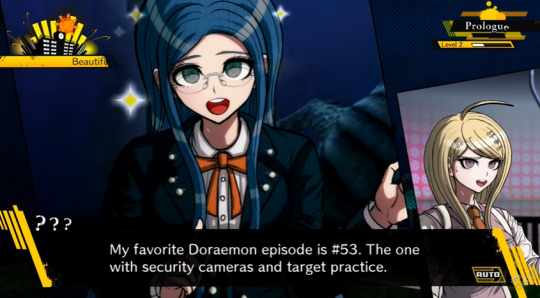
Some pretty overt foreshadowing here. In the Japanese script, her reference is ep. 53 of Kiteretsu Daihyakka instead of Doraemon. I like the change for the dub, even though it’s pretty obvious. Someone who knows DR primarily through the dub is less likely to know about the franchise’s connection to Doraemon, anyway.
Tsumugi also points out the weird dragon statue in the hallway that will lead into a new part of the school down the line. It’s a neat little metatextual trick on the audience, because it’s the kind of thing that’s not suspicious at all on a first playthrough. She’s an NPC in a DR game, of course her dialogue is gonna point out plot devices that will be relevant shortly, but on a reread you know she’s being deliberate about it. This is far from the last time this kind of thing happens with Tsumugi.
Lastly, this charming observation from Kaede about why she’s maybe not so plain afterall.
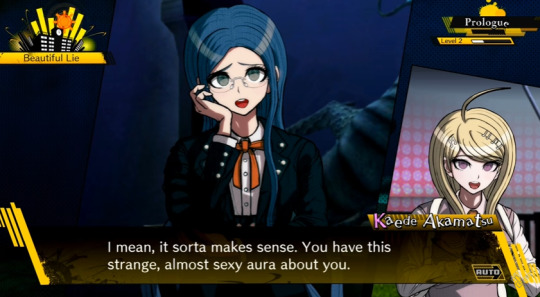

Kaede puts it in the worst way possible, but it’s interesting that she, a person with a generally good read on people, decides immediately that there’s more to Mugi than meets the eye. Not only that, she relates it specifically to an audience spending a lot of time looking at her. If she were any less gross about it, Kaede making this kind of observation would land like a big clue.
This leaves us with the biggest question from the prologue: if Kaede wasn’t too busy being horny and gay, could she have put two and two together and thwarted the ringleader?
There is SO much more to say about Tsumugi, so I’m really excited to dig deep into other chapters!
150 notes
·
View notes
Text
PARTISAN INFORMATION ECOSYSTEM, PART I
To begin this posting, a word in support of the Pew Research Center. What a service for the American people. It is a nonpartisan think tank or “fact tank” as it refers to itself. Headquartered in Washington, D.C., it publishes information over various issue topics, i.e., social issues, public opinion, and demographic developments within the US and the world in general. Also, it reports on media and its content and provides overviews of empirical studies from the various social sciences.
It is organizationally funded by The Pew Charitable Trusts and has been providing the general public with insightful and timely research reports since the 1990s. For those unfamiliar with the Pew Charitable Trusts, it is a nonprofit, tax-exempt organizational arrangement that funds various nonprofit entities like the Pew Research Center. The Center is also funded by the Templeton Foundation. To illustrate its work, there has been a series of studies supported by the Center on the issue of polarization. One such effort is highlighted in this posting.[1]
Robert Faris, et al., looked into the 2016 presidential election, found various actions by rightwing actors that constituted what the study calls “right-wing ecosystem,” affecting the results of that election. The ecosystem includes the Fox News setup but also has an array of other contributors as this posting indicates. Most of that activity relative to the 2016 election revolved around what the Center study calls “two chief dynamics” and, as such, provides two lessons for future elections.
The two dynamics targeted the Clinton Foundation. The first dynamic aimed at setting an effective public agenda. In part, this dynamic was nothing new; it consisted of opposition research. That is, it consisted of tough partisan investigation, reporting, and messaging of information aimed at portraying Clinton and her campaign in the worst way. What made it somewhat unique was how thorough or deep it was as well as how far back their research went. Interestingly, this effort began before Trump became part of the story.
This tale seems to have begun with the publication of the book, Clinton Cash, a scurrilous account of donations to the Clinton Foundation and speaking fees to the Clintons by moneyed interests in exchange for public policy enactments or proposals. The book was written by Peter Schweizer and published in July 2016. Here’s the Amazon’s advertising blurb for the book,
In 2000, Bill and Hillary Clinton owed millions of dollars in legal debt. Since then, they’ve earned over $130 million. Where did the money come from? Most people assume that the Clintons amassed their wealth through lucrative book deals and high-six figure fees for speaking gigs. Now, Peter Schweizer shows who is really behind those enormous payments.
… Schweizer [in a previous best-selling book] detailed patterns of official corruption in Washington that led to congressional resignations and new ethics laws. In Clinton Cash, he follows the Clinton money trail, revealing the connection between their personal fortune, their “close personal friends,” the Clinton Foundation, foreign nations, and some of the highest ranks of government.
Schweizer reveals the Clinton’s troubling dealings in Kazakhstan, Colombia, Haiti, and other places at the “wild west” fringe of the global economy. In this blockbuster exposé, Schweizer merely presents the troubling facts he’s uncovered. Meticulously researched and scrupulously sourced, filled with headline-making revelations, Clinton Cash raises serious questions of judgment, of possible indebtedness to an array of foreign interests, and ultimately, of fitness for high public office.[2]
Apparently, the book does bring up verified decisions by Hillary Clinton that did favor various sponsors of her husband’s speaking engagements – at hefty fees – but the evidence reveals only questionable timing.
Here is how a Newsweek review of the book summarizes the book’s reportage of what actually happened,
The book contains many more lurid examples of Bill and Hillary doing things that look bad—from Bill taking juicy speaking fees from a major investor in the Keystone XL pipeline while Hillary's state department reviewed the pipeline deal, to the Clinton Foundation accepting donations from a Swedish mining investor who more or less financed a coup in the Democratic Republic of the Congo.
None of these actions are illegal. And it's not even clear if they're related. The rooster doesn't cause the sun to rise, but this is the thrust of Schweizer's argument. He never proves any laws were broken—in fact, he practically begins the book by hedging his accusations: "I realize how shocking these allegations may appear. Are these activities illegal? That's not for me to say. I'm not a lawyer."
Indeed not. Nor are the vast majority of American voters. And this fact is what Schweizer is counting on, presumably, because, while he points out many instances of Hillary and Bill Clinton doing things that look bad, he doesn't include any instances that rise to lawbreaking.[3]
What added to the effect of this dynamic (including publishing the book), Steve Bannon and his publishing interest, Breitbart News, proceeded to produce and distribute a film version of the book. But of interest, the book was released months before Trump became the Republican candidate.
But more calibrated was the release of the film and calls for Congressional investigation of the entailed charges to coincide with the usual bump a party convention would receive after its conclusion. All of this was further coordinated with a well-organized email release to highlight the film. The rightwing media ecosystem held back the story from public release until the mainstream media took up the story. Those in that broader media platform played an essential role in “spreading the word.” They in effect legitimized the story and, in turn, it became part of the public discourse.
How can public or private policy address this disruptive development – a development that, in effect, spreads as truth information concerning unfounded, illegal behavior? One challenge is: any public policy must not be inconsistent with First Amendment rights of free speech. The Center opines that such developments needs to be met by a “highly vigilant professional press.”
Yes, the press today is being hacked (information the Center added to the report as relevant) and such overviews call for serious surveillance which, in turn, depends on time-consuming efforts on the part of editors. But the republic’s future seems to depend on the press to inform its readers and viewers as to such efforts as exemplified by the Clinton Cash case. Sure, if an editor receives what is called an “exclusive” from a source such as Schweitzer painting a public figure, such as Clinton (either one), negatively, that will deserve an editor’s attention. But that is where the interchange begins.
The Center’s summary states, “Tracking down the funding and sponsorship of Schweitzer’s research, and developing an investigative story about who is behind this assault and why it is being launched, is harder. It is, nonetheless, the fundamental professional responsibility of the press if it is to retain its unique role.”[4]
So, this is the first dynamic that the Pew Research Center offers in its related study. The next posting will look at the second dynamic, the role of propaganda and misinformation.
[1] Robert Faris, Hal Roberts, Bruce Etling, Nikki Bourassa, Ethan Zuckerman, and Yochai Benkler, “Partisanship, Propaganda, & Disinformation: Online Media & the 2016 U.S. Presidential Election,” Berkman Klein Center for Internet and Society, Harvard Library (n.d.), accessed August 19, 2020, https://pdfs.semanticscholar.org/76a9/3eb0bed8ff032c44186678c5279f20cc5ff8.pdf?_ga=2.230250332.1151241653.1597869609-1463880478.1597869609 .
[2] Amazon (online marketing statement), “Clinton Cash: The Untold Story of How and Why Foreign Governments and Helped Make Bill and Hillary Rich” – book title, (n.d.), accessed August 20, 2020, https://www.amazon.com/Clinton-Cash-Foreign-Governments-Businesses/dp/0062369296 .
[3] Taylor Wofford, “Everything You Need to Know about ‘Clinton Cash,’ Newsweek, May 1, 2015, accessed August 20, 2020, https://www.newsweek.com/everything-you-need-know-about-clinton-cash-327694 .
[4] Robert Faris, et al., “Partisanship, Propaganda, & Disinformation,” 130.
#Pew Research Center#right-wing information ecosystem#polarization#Hillary Clinton#Bill Clinton#2016 election#civics education#social studies
0 notes
Text
Star Wars Episode VII: The Force Awakens review
‘A 7/10 is a work that is, for the most part, successful in its intentions. It’s a worthy and entertaining experience that perhaps slips a little here and there in how it keeps you engaged. It might have issues that frustrate, or it might be an acquired taste, but it certainly deserves to be elevated about its peers for reasons of quality, uniqueness, or ambition.’
- Me, 2017
A few months ago I wrote an article detailing my rating criteria. I wanted not just to inform the reader as to how I come to make my decisions, but set out some clear guidelines for myself, something that I could come back to if ever I felt uncertain about exactly where my feelings fell and, perhaps, to mark a line in the sand that would help me come to terms with some of the more negative feelings I have towards popular pieces of media. Above you can see the little blurb I wrote for what I believe a 7/10, or a ‘good’ film or novel or video game stands for, and I want you to pay particular attention to the last four words – ‘quality, uniqueness, or ambition’ – because for now they’re going to be important.
Star Wars Episode VII: The Force Awakens is a film by J.J. Abrams Disney’s board of directors. It is the seventh film in the series, and most reviewers regarded it as a welcome return to form following George Lucas’ shockingly inept reappearance with the prequel trilogy in the late nineties/early noughties. For the majority of today’s youth, their memories of Star Wars are defined by these pulpy, clumsy, brightly-coloured prequel movie. They films were a big thing at the time, make no mistake, partly because of the anticipation held by established fans, and partly because children couldn’t escape the merchandising that littered every fast-food restaurant on the planet. But, like the overpriced plastic cups bearing Darth Maul’s scowling visage, so too were the films disposable tat, aimed at drilling gaudy two-dimensional images into the modern consciousness. Lucas, for his part, has always remained steadfast in his belief that his vision of Star Wars was the ‘one true’ Star Wars, but some cursory and utterly unscientific polling on my part indicates that children that were first introduced to the series via the prequel trilogy largely lack the reverence for the series that those who were weaned on the classic three. And why would they? What about the prequel trilogy would leave any self-respecting individual hungry for more, especially after the sinister mystery and the darkness of Darth Vader has been replaced with this:
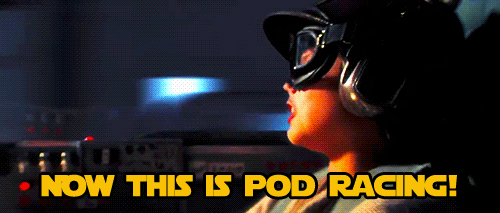
And this:
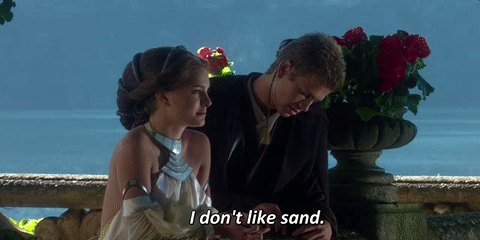
I can only speak for myself at this point, but as someone for whom the stories of Luke, Leia, and Han were an irreplaceable part of my youth, the thing that made me return to Episode Two and Three was a naive and desperate hope that things would change - the same naive and desperate hope that led me to believe that Disney might be the saviour of the franchise, or that Star Wars Battlefront II would be anything other than a greed-raped stain upon the world, which is to say that at midnight on the night of The Force Awakens’ UK release I too was hopeful for something, anything other than the ugly, bloated, and utterly asinine prequel trilogy.
But ‘a return to form’ from older fans desperate to purge the memory of Mister Binks et al. is not necessarily a definitive seal of quality. Nor is the endorsement of a generation of people that never knew the original trilogy in a context separate from Hayden Christensen’s sand tantrums. And as the minutes and days and weeks stretched on following my first and only viewing of Episode VII, I found myself more and more disgruntled by it, by the memory of it, and by the many faults that existed despite the low bar it had to leap to be better than its immediate predecessors.
Now don’t get me wrong - The Force Awakens is not a technical failure, nor could it reasonably be called a ‘bad film’ were it to exist in a vacuum; from most angles it is objectively better than all three of the prequels, but I can’t say that it demonstrates either uniqueness or ambition. It’s possibly the most brazenly derivative film I have ever seen, and to simply call it ‘safe’ would be to seriously understate the depth of the film’s cannibalisation of its own mythos. This lazy and insulting lack of originality is made worse by frustratingly insubstantial glimpses at a wider narrative which are followed by, at best, nothing, and at worst…well:
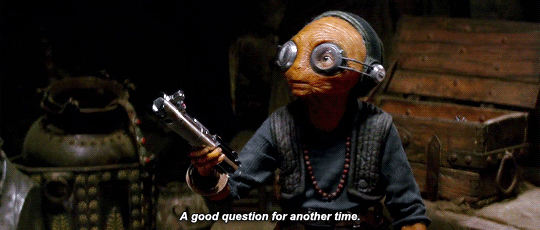
‘You haven’t bought the season pass that unlocks the rest of this film’s plot.’
The above moment was not the first point in The Force Awakens that I audibly groaned, but it was the point that I remember the best because it typifies the one of the biggest problems with the film: nearly everything in the narrative of this film that might otherwise be interesting is left unelaborated - the story has been gutted and the meat saved for a time when the Star Wars Plot Advisory Committee can inform future auteurs directors writers meat puppets as to what they can and can’t include in order to maximise appeal amongst the key age demographics of zero-to-dead. And I would apologise for the slight spoiler in the above gif, but if you think that the scene contains some pivotal plot point or revelation then you’re wrong. The film repeatedly hints at a grander and more engaging arc that it doesn’t just fail to elaborate on, but actively hides from the viewer behind the most galling cardinal sin in storytelling - the ‘I can’t explain now’ hook. Worse still is the fact that the film doesn’t explain why it can’t explain, we’re simply expected to swallow it hook, line, and sinker. I imagine that at this point, Abrams Disney pictured the audience on the edge of their seat wrapped in suspense, not scoffing and searching the theatre for other visibly incredulous patrons as I was. In any case, I couldn’t spoil the plot of the film for you if I tried, because everyone who has watched the original trilogy has seen it already.
A plucky, Force-adept youngster lives on a desolate sand planet. After coming under threat from an army of technically superior stormtroopers, the youngster flees on the Millenium Falcon, falling in with a scrappy bunch of resistance fighters. Leia Organa and Han Solo assist. They are pursued by an evil Sith Lord in a black mask and are tasked with demolishing a super-weapon capable of destroying planets. The main characters infiltrate on foot, and the oldest of them dies. A group of pilots attack the super-weapon from space, and their weapons cause a chain-reaction that destroys it.
Sound familiar? Of course it does, because it’s the plot of A New Fucking Hope. You know this by now because it’s two years later and you’ve read all the reviews, but I can’t overemphasise just how much of The Force Awaken’s story is copy-pasted directly from the first film. But at least Mr J.J. Abrams Disney makes a pretty fucking compelling case as to how the Starkiller Base is NOT AT ALL like the Death Star (apart from the fact that it has exactly the same function, and contains the word ‘star’ in its name, and a word relating directly to death).
I mean, for one thing, it’s bigger. That completely changes everything right there.
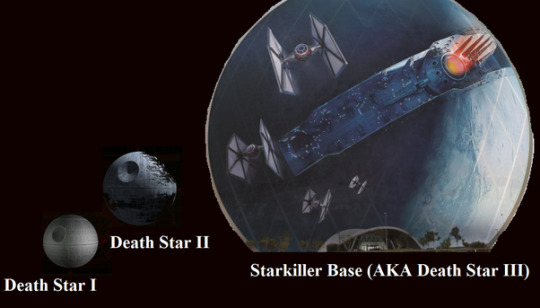
Sorry J.J. Disney, my bad.
You’ll also notice that the design of the Starkiller Base is what I like the refer to as ‘shithouse’, and ‘not at all memorable’, which might be the single biggest difference between the two weapons. Maybe I was wrong after all.
Sigh, but it’s not all bad, I guess. In fact, the one single thing that I think they managed to do right was arguably the hardest thing to do - nail the new characters. While it’s clear that this is Daisy Ridley’s first major film, she has enough charisma and courage to allow Rey to be the naive vessel the audience needs. She stands particularly strong in scenes across from Adam Driver’s villain, Kylo Ren, and their emotional tug-of-war is compelling. John Boyega is a natural performer, and his exemplary comic timing is keenly displayed both in his dialogue and through his performance. These three people form the pillars of energy and focus upon which the entirety of the film’s integrity rests. Harrison Ford’s comeback is welcome, but much of his input feels keenly meta and thus at odds with the character of Han as we knew it, exposing J.J’s Disney’s weakness at adapting such well-established and iconic personalities. I might say the same for Carrie Fisher, except she has fuck-all to do but stand around, talk in no detail about anything, and have her disgusting old age blurred out by a tasteful CGI filter that sits over her face the entire time. Oh, and Oscar Isaac plays a pilot gifted with the ability to destroy planet-sized doomsday cannons in 30 seconds of screen-time. Which is…y’know, a great way to end a film (and further invalidate a threat that was outmatched forty years ago by a plastic orb on a string).
But again, my vitriol has outpaced me, so I need to come back and reiterate that, as an individual viewing experience, The Force Awakens is not a ‘bad’ film. It’s capably shot, has some witty dialogue, and a good cast with an excellent grasp on their characterisation and fantastic rapport. It isn’t perfect no matter what lens you view it through, and some of its greatest flaws come as a result of Disney’s clear desire to make the most mass-appeal product possible, but if you’re looking for some safe, immediate entertainment that won’t demand much from you, then The Force Awakens is a reasonable choice.
But I’m not sure if I’ll ever feel compelled to watch it again, because at its core I don’t think this film is art. I don’t think it exists for any reason other than because a company saw a demand they could offer a supply to, and make some sweet dollas in doing so. It checks the boxes on its list of ‘things to please the average moviegoer’ so transparently that it almost feels as if it were written by an algorithm, and as much as the people in it are trying to make something meaningful of it all, The Force Awakens remains a product, an item, market-researched so thoroughly your psyche can still detect the aura of the focus-grouped decisions at every turn. It’s in the absurd jokes, and the conspicuous acceleration through the thin plot, and the way it waves references in your face like someone trying to get a smile from a baby by jingling their keys - it feels like the film is toying with me, pointing at all the positive reviews and asking me goadingly why I don’t come over and play with it like everyone else. Perhaps if I weren’t so cynical I could get past that, but I can’t forgive the insidious process through which Disney churns these movies out. As shitty as the prequel trilogy films are, you simply can’t say that they’re not imaginative, original, or creative - the unmistakable imprint of George Lucas’ mind was branded upon them, for better or worse. Whose creative mark lies upon The Force Awakens? It’s been sterilised by Disney’s corporate cloth, and watching it feels like watching a stranger rifling through someone else’s old stuff and playing ‘Star Wars’ with toys that aren’t theirs to touch. It’s not a ‘good’ film. It’s not a 7/10. It’s just okay.
6/10
Just Okay
#star wars#the force awakens#george lucas#j.j. abrams#disney#film#review#cinema#a new hope#2015#john boyega#daisy ridley#carrie fisher#harrison ford
1 note
·
View note